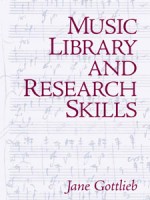Title
Jane Gottlieb has been teaching music library research for more than 20 years. In August, Prentice Hall published Gottlieb’s book, Music Library and Research Skills, which distills her years of experience as both a professor and librarian into a 384-page reference text. Modeled in part after her research methods course at Juilliard, the book is an introduction to basic concepts in how to conduct research in music, and encompasses the latest technologies and resources available to students. It is broadly inclusive in its subject matter, with coverage of popular music, jazz, and world music sources, as well as sources on Western art music.
Body
Music Library and Research Skills is designed to set a new standard for teaching music bibliography. As Gottlieb explained in an interview, “It’s a matter of demonstrating how music reference sources—both print and electronic—may be used to explore various types of research inquiries.” Each of the book’s 12 chapters presents annotated listings of key resources, as well as narrative introductions on use of these resources in the research process. Listings are complemented by “how to” sidebars and anecdotes or “real life scenarios,” most of which are drawn from Gottlieb’s years of teaching and work with students in the library.
When searching for music, she points out, a user may be looking for a score, a sound or video recording, or literature about the work. Gottlieb notes that the first thing a librarian must determine while assisting a researcher is what that person actually is looking for. Her book is designed to help students and readers develop the ability to go through this process for themselves.
Another important component of research is the evaluation of information, she said. According to Gottlieb, “Because we’re so bombarded with information, especially with the Internet, the key to understanding anything is being able to evaluate the information that comes to you, whether it’s on the Web or in a printed book.”
With the explosion of technology over the last decade, many of the familiar tools of information, such as a card catalog, have become obsolete. Gottlieb points out that information technology changes so quickly that it can even be challenging for librarians to keep up with new tools. And, students growing up in the age of computers may face difficulties in music research, in that they tend to ignore resource materials that are not in an electronic format.
Gottlieb challenges her student’s dependence on electronic data by underscoring the continued importance of print resources at a time when so many technological tools are available. An example she uses to demonstrate this is the search for information on Beethoven’s piano sonatas. Most of the books containing critical information on this subject were published before 1940, she explains, and a student would not have access to them if they were consulting only electronic materials.
In what Gottlieb refers to as “the universe of information about music,” it is important to understand not just when, but how to use an electronic tool. Although today’s tech-savvy students are quick to utilize Google-type searches, library catalogs do not always function in the same way. Gottlieb explains how library catalogs use complex systems of what is termed “authority control,” to insure that all occurrences of a name, title, or subject search are retrievable by standards established by the Library of Congress. For example, Mozart appears as “Mozart, Wolfgang Amadeus, 1756-1791,” and all references to his opera The Marriage of Figaro will appear under what libraries call its uniform title, Le Nozze di Figaro. For users, this means that keyword searches under “Marriage” and “Mozart” may not yield immediate results. “But our library catalogs,” says Gottlieb, “are set up to direct users to these standard forms, so users do not need to know this on their own.”
As research tools and methods continue to progress, Gottlieb predicts more changes. “In the case of audio and video,” she observes, “we are definitely moving away from physical carriers—CDs, DVDs—to digital transmission.” But she predicts that libraries will “continue to have a mixture of print and increasingly sophisticated electronic resources,” although the latter will not replace the former, especially in the case of printed scores and books.” Gottlieb will expand on some of these ideas in her September 23 Doctoral Forum presentation, “Libraries and the Universe of Information on Music: Keeping Our Books, Preserving Our Values.”





